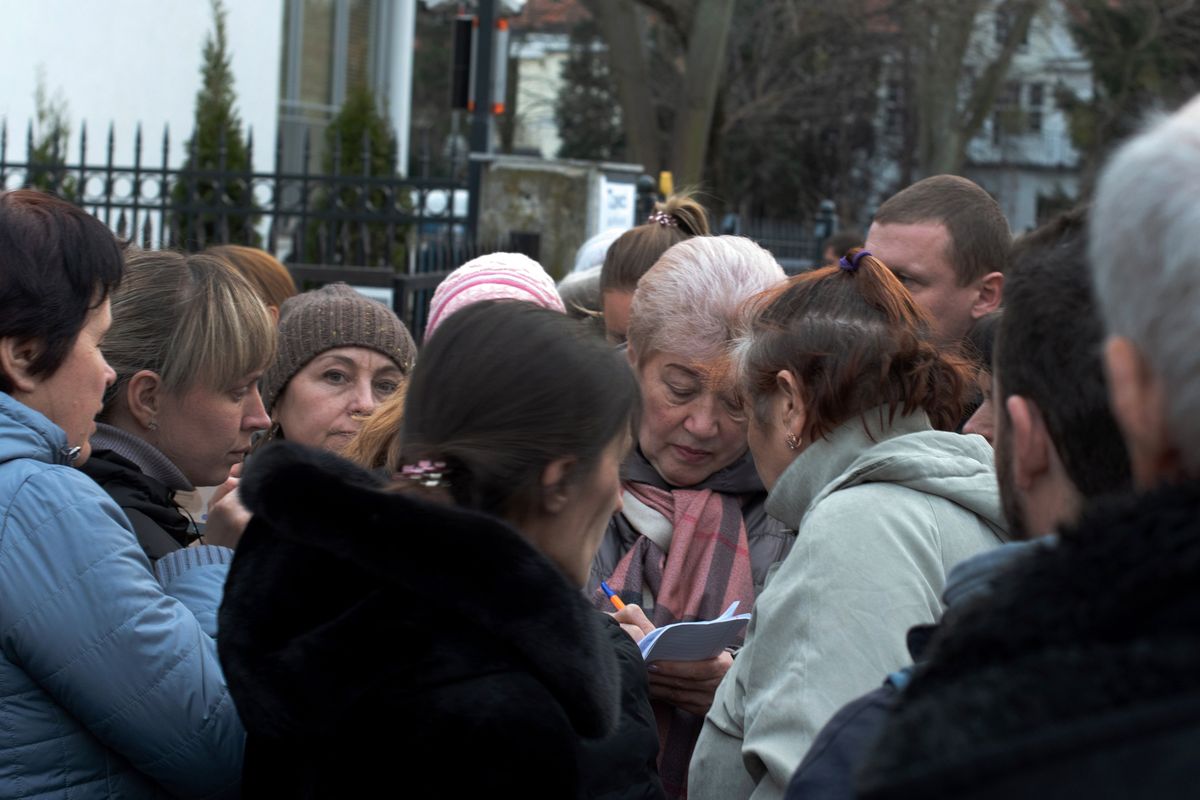As millions flee Ukraine, would-be do-gooders stuck behind regulatory hurdles

WARSAW, Poland – Olga Gorbachova knew she had to act fast when war erupted in Ukraine.
She was born in Ukraine but is now a farmer in Australia. But her 76-year-old mother still lived in Kharkiv, a Ukrainian town less than 30 miles from the Russian border. As Russians advanced, her mother fled making it safely to Poland, where Gorbachova met her and now hopes to relocate her to Australia.
The only problem? Her mother doesn’t have a passport.
That’s why Gorbachova and her mom were waiting Tuesday in front of the Ukrainian consulate in Warsaw among at least 100 other refugees. The crowd was mostly women and children all whom hope to get a passport from the Ukrainian government so that they can go to other countries.
“She needs documents,” Gorbachova said.
Others’ stories echoed this sentiment, a repetitive dirge of displacement.
Kulchystska Olsanq fled Donetsk on March 6, her son, Maxim, in tow. He turned 9 on the train fleeing the war-torn city. Her husband remains behind. Tamia Stelmah, her eyes hollowed from exhaustion, and her two children told a similar tale. All said they wanted to go home, yet all were practical enough to try to get passports. Gorbachova estimates she’s seen 1,000 refugees at the consulate each day. All looking for paperwork.
It’s just one example of how the roughly 3 million Ukrainian refugees that have fled have stretched civil and social infrastructure, mainly in Poland. Train stations have been packed with refugees fleeing the Russian advance. AirBnB booked. Hostels and hotels full. Stadiums converted to shelters, their floors filled with cots, women, children, pets and the occasional man huddled around phone screens watching for war updates.
Many of these refugees don’t have passports. While Poland and several other bordering countries have opened their borders, refugees are unable to pass along to other countries without a passport. That means they will remain in Poland until that paperwork is completed.
“Everybody thought in the beginning it was a sprint,” said Joanna Fiks, a Polish volunteer in Krakow. “But no, it’s a marathon.”
Foreign volunteers have flooded Poland and Ukraine in hopes of helping. But while there is need, there isn’t always a system in place to organize or distribute that would-be aid, a fact Spokane doctor Kyle Varner is discovering.
“The manpower is already here on the ground. It’s already available,” Varner said Tuesday from Warsaw. “We really need the Polish government to open the doors. To give us a green light.”
In Varner’s case that would mean liberalizing Polish laws regarding medical licenses.
“They need to open up some kind of emergency pathway as foreign doctors,” he said. “There are some people who are basically setting up shop without regulation and that’s not something I’m willing to do. I don’t want to end up in Polish jail.”
Instead, Varner has spent his days purchasing medical supplies, soliciting donations and trying to make connections on the ground in western Ukraine and Poland. He’s working with MedGlobal, a medical nonprofit based in Chicago.
John Kahler, a Chicago pediatrician who works for MedGlobal and is in Poland agrees with Varner’s assessment. In his view, the current wave of refugees has peaked, although he predicts a second wave if Russians continue advancing.
On Wednesday, Varner will travel to the Polish-Ukrainian border and conduct a needs assessment for MedGlobal.
“They are in dire need of manpower for health service, but regulatory issues aren’t solved yet,” he said.
Varner added, “We have the qualified manpower. We have the money. And there is a huge need. It’s only going to get worse.”
Spokesman-Review reporter Eli Francovich is in Eastern Europe to cover stories with ties to Spokane. Francovich’s articles will appear throughout the week. His trip was paid for largely by Spokesman-Review readers who have donated to the Community Journalism Fund and through the newspaper’s Northwest Passages event series. To help support this trip and similar newsroom efforts, contributions can be made at www.spokesman.com/thanks.
This story can be republished for free under a Creative Commons license.